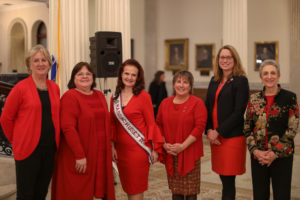BOSTON – Lawmakers gathered at the State House on Tuesday morning to raise awareness of heart disease and stroke as the number one killer of women.
The event was part of Go Red For Women, a campaign led by the American Heart Association that advocates for more research and swifter action for women’s heart health. About 75 lawmakers wore red to show their support.

House Speaker Robert DeLeo, D-Winthrop, speaks at an American Heart Association Go Red For Women event at the State House on Tuesday.
House Speaker Robert DeLeo said that since Go Red For Women launched in 2004, nearly 300 fewer women die from heart disease and stroke each day. He urged women and men in Massachusetts to pay attention to factors that can increase their risk of cardiovascular disease.
“I know how scary it can be to take that very first step,” said DeLeo, a Winthrop Democrat. “Now that I’m a granddad, I’m especially cognizant of the need to keep up with doctors’ appointments and keep track of your health. Knowing your blood pressure, your cholesterol, and your glucose is the best way to make decisions that can save your life.”
Acting Senate President Harriette Chandler said she comes from a family with a long history of cardiovascular disease. While Chandler acknowledged the progress in reducing deaths from heart disease and stroke over the past decade, she urged lawmakers to continue to make “sure we do everything we can” to empower women to take charge of their heart health.
“We’ve come a long way, but we still have a longer way to go,” said Chandler, a Worcester Democrat. “It’s up to you to make it possible.”
The State House Go Red For Women event was organized by the American Heart Association and the Massachusetts Caucus of Women Legislators. Caucus member Colleen Garry, a Democratic state representative from Dracut, said while there are many similarities in the symptoms of heart disease in men and women, there are even more differences – differences that could mean the difference between life and death.
Garry knows this firsthand. Her mother was diagnosed with heart disease 11 years before she died of a stroke.
“When my mother first got sick, she thought it was indigestion,” said Garry. “She didn’t want to know that it was her heart. In the long run, she would have had less damage had she been diagnosed right away.”

Pictured left to right are Rep. Mary Keefe, D-Worcester; Rep. Colleen Garry, D-Dracut; heart disease survivor Sandra Holloway, Townsend; Sen. Anne Gobi, D-Spencer; Rep. Christine Barber, D-Somerville; and Rep. Ruth B. Balser, D-Newton.
Even though heart disease is the No. 1 killer of women in the United States, women often chalk up the symptoms to less life-threatening conditions like acid reflux, the flu or normal aging, according to the American Heart Association. The organization notes that the signs of a heart attack in women often include shortness of breath, upper back pressure, dizziness, lightheadedness, or fainting.
Sandra Holloway, a Townsend resident who went into heart failure five years ago, shared her story with lawmakers at the State House. Holloway, 51, was recently crowned Mrs. Massachusetts International 2018 and has used the platform to advocate for women’s heart health.
After being diagnosed with breast cancer in her 20s, Holloway allowed her weight to balloon to over 370 pounds. When her youngest son graduated from high school five years ago, she committed herself to eating healthier and exercising more. Holloway was on her way to losing nearly 70 pounds when she went into cardiac arrest while out for a walk. The incident left her temporarily confined to a wheel chair and requiring supplemental oxygen.
Since then, Holloway has worked hard to regain her health. She has lost 250 pounds and has been able to maintain a healthy weight.
“As a woman, I understand that especially in society today, we don’t slow down and pay attention to the fact that we need to take care of ourselves,” said Holloway. “Understand your factors, understand your blood pressure. As women, we need to take care of ourselves, so we can be an inspiration to our children and our communities.”


